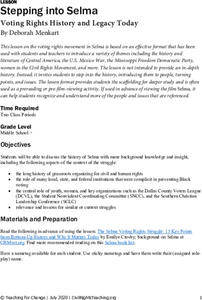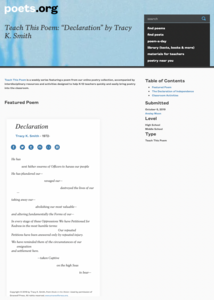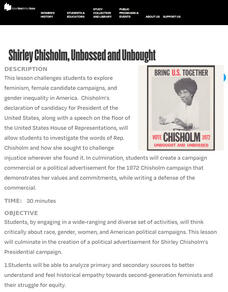Core Knowledge Foundation
Ray Charles
Introduce young learners to the read-aloud process with a short biographical passage about Ray Charles. After listening to the passage, class members respond to factual, inferential, and evaluative questions, and then create a timeline...
C-SPAN
1968: The Poor People's Campaign
The Poor People's Campaign of 1968 marked a shift in the civil rights movement to economic issues. Speakers in four C-SPAN video clips discuss different aspects of the campaign including Resurrection City, the Economic Bill of Rights,...
Learning for Justice
Mary McLeod Bethune
Young historians conduct a close reading of the text of an interview with Mary McLeod Bethune, the daughter of former slaves who taught herself to read, grew up to establish schools for other Black women, and went on to become an advisor...
National Endowment for the Humanities
Harriet Tubman and the Underground Railroad
While many have heard of Harriet Tubman, few are aware of the many ways this remarkable woman was involved in the United States Civil War, the abolitionist movement, and the Underground Railroad. Young historians examine primary source...
National Endowment for the Humanities
Toni Morrison's Beloved: For Sixty Million and More
Complex, disturbing, and challenging, Beloved is the focus of a lesson that provides three activities to guide a close reading of Toni Morrison's novel. Readers create chapter titles based on key plot elements or themes, identify...
Historic New Orleans Collection
Exploring Primary Sources: Music in New Orleans
Looking for a new and exciting way to teach young historians the art of primary source analysis? Jazz up your lesson plan with a resource that asks class members to analyze photos, travel documents, and letters written by some of New...
Teaching for Change
Stepping into Selma
The 1964 Selma to Montgomery, Alabama voting rights marches are the focus of a lesson designed to introduce learners to people who took part in the Civil Rights Movement. Class members set into the role of one of the participants,...
PBS
Out of the Shadows | Black America Since MLK: And Still I Rise
Two powerful video clips launch a study of race relations in the United States after the Selma, Alabama riots, the passage of the Votings Rights Act, and the riots in Watts, California.
Academy of American Poets
Teach This Poem: "On Being Brought from Africa to America" by Phillis Wheatley
Phillis Wheatley's poem, "On Being Brought from Africa to America" is the focus of a lesson that asks readers to consider how the poem is a critique of slavery. Groups comprise a list of words and phrases they notice as well as questions...
DocsTeach
Fannie Lou Hamer and Voting Rights
To understand the challenges Black voters faced in Mississippi, middle schoolers first gather background information about Fannie Lou Hamer and then read her testimony given during the 1964 Democratic Nation Convention. After a...
Crafting Freedom
Creating Original Historical Fiction Using Henry "Box" Brown's Narrative and Runaway Slave Ads
Young historians discover the experiences of runaway slaves after reading the brief biography and narrative excerpt of Henry "Box" Brown, who escaped slavery by having himself shipped away in a crate and popularized his flight in a...
Crafting Freedom
The Self-Empowerment of Harriet Jacobs
After reading Harriet Jacobs' Incidents in the Life of a Slave Girl, one of the most famous slave narratives of all time, learners imagine what it would have been like to experience the small dimensions of her hiding space. They then...
Student Handouts
Geography of Dr. Martin Luther King, Jr.
Young geographers follow Dr. Martin Luther King's journey during the civil rights movement by identifying major events on a map of the eastern United States, such as his birth in Atlanta, Georgia and his famous "I Have a Dream" speech in...
C-SPAN
Last Days of Martin Luther King, Jr.
On April 4, 1968, Dr. Martin Luther King, Jr. was assassinated in Memphis, Tennessee. Four video clips reveal the events of that time, including the shift in the focus of the Civil Rights Movement, the aftermath of the assassination, and...
Digital Public Library of America
The Watsons Go To Birmingham—1963 by Christopher Paul Curtis
A primary source set of photographs, videos, newspaper articles, and FBI reports provides insight into race relations during the 1960s, the Sixteenth Street Baptist Church bombing, and the murder of Emmitt Till. Designed to be used to...
University of North Carolina
Remembering Martin Luther King, Jr.
After reading the article "Kings Dream Everyday," class members conduct a Socratic seminar discussion of Martin Luther King's contributions to the civil rights movement. They then read and respond to a passage from Michael Eric Dyson's...
Albert Shanker Institute
The March on Washington Logistics Then and Now
I have a dream ... that all pupils will be able to organize a march of their own after learning about how Bayard Rustin organized the 1963 March on Washington for civil rights. Young reformers work collaboratively examining informational...
Albert Shanker Institute
Who Was Bayard Rustin?
Who was Bayard Rustin? Pupils analyze a series of primary source documents to learn about this important figure in the civil rights movement. The activity contains a short film to watch along with guiding questions and other resources...
Academy of American Poets
Teach This Poem: “Declaration” by Tracy K. Smith
Tracy K. Smith's erasure poem "Declaration" challenges scholars to use their noticing skills to make connections between an engraving entitled "The Declaration of Independence" and Smith's poem. Class members record observations and...
C3 Teachers
Emancipation: Does It Matter Who Freed the Slaves?
Scholars generally agree on the emancipation of enslaved people in the United States. This inquiry-based lesson asks high schoolers to consider more than the claims of who freed the enslaved people but the significance of the issues...
PBS
Democracy in Action: Freedom Riders
This is a must-have resource for every social studies teacher covering the civil rights movement. Through an engaging video and detailed viewing guide, young historians learn about the Freedom Riders, and discover how everyday...
Curated OER
Quilting Our Diverse Classroom
Students explore diversity and race by creating art. In this ethnic background lesson, students discuss their family history, where their relatives lived and how it affects their life today. Students create pieces of a quilt representing...
K12 Reader
Booker T. Washington: Up From Slavery
Read Booker T. Washington's inspiring story about arriving at his name with a short reading passage from his autobiography, Up From Slavery. After class members read the excerpt, they answer two reading comprehension questions about the...
National Woman's History Museum
Shirley Chisholm, Unbossed and Unbought
An engaging resource introduces young historians to Shirley Chisholm, the woman, the Black congresswoman, the activist, and the candidate for President in 1972. Class members study primary sources, watch a video of her announcing her run...

























